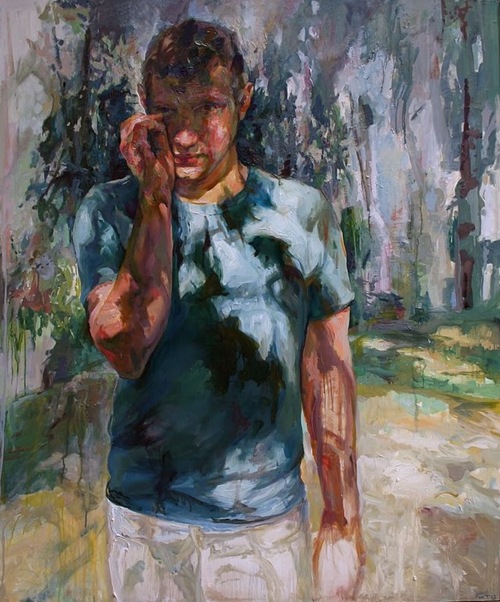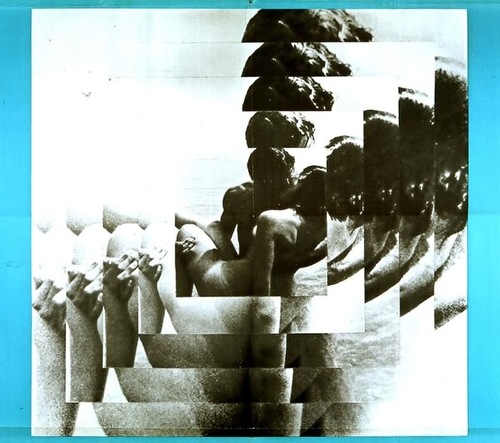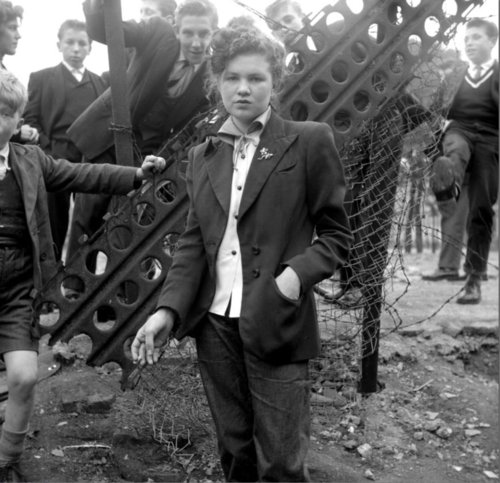
Moonface – SKM
I hate montages.
Playing badminton for the first time in several months I keep thinking about how, in a few short weeks or months – just a montage away! – I’ll be drastically skinnier and oh my how much better I’ll be. Maybe I’ll have attracted a girlfriend by then, seducing her with my precise serves and washboard abs, or maybe she’ll fall for the masculine way I wipe the sweat off my forehead with a white hand towel.
I have to keep reminding myself that time doesn’t work like that. It goes one increment at a time, and the increment currently before me includes just trying to return the serve.
– – – – – – – – – – –
I made a time-lapse video once. They tore down and rebuilt the building across the street from where I worked, part-time for $8.25 an hour, at a media library. My boss thought it’d be interesting to document, so we took one of the camcorders out of circulation and pointed it out the window. After a few months (I quit, shoved my belongings in my Corolla, and drove to California on a whim before they finished) we had a pretty interesting several minute clip. You could see the frame slowly grow, story by story, a skeleton of steel transforming into a building where, presumably, others would find themselves underemployed and dreaming of moving West.
Watching the clip, however, I could never shake one concern. What would the construction workers think, watching it? The guys in their silly yellow helmets who sat out in the sun grunting and scratching themselves and taking extended lunches at the hot dog joint two doors over – would they appreciate that all their toil had been reduced to a few seconds of poorly-lit footage?
I imagined not. I imagined the video would belittle what they could feel running an ungloved hand over the concrete wall or standing on the roof, booted feet sticking out over the edge, looking down at the city around them.
– – – – – – – – – – – – – – –
I return the serve, but poorly, the birdie coming off the edge of the neon webbing. Instead of springing to the far corner, where I’d aimed, it slouches to mid-height. Shawn’s stinging return zips to where my partner, Chi Yuan, can barely reach in time. Chi Yuan, turned completely backwards and reaching away from the net, manages a flick of the wrist – badminton is all about the wrist – to send the birdie over his shoulder and the net. It’s at smashing height, though, and Shawn duly crushes it straight down the middle. Falling forward, I hit a tepid return, but it’s at the same spot, and Shawn easily smashes past my sprawled body.
It always interests me to note that points are not lost off some mistake on the last hit – the mistakes come three or four or five strokes prior. It just takes some time for the game to punish you.
Another flaw in my fantasy at the end of the montage – I will never be a great badminton player. Don’t get me wrong, I could become very good. My fundamentals and footwork are sound, cultured during the years I played as a child in Indonesia. And I pack a pretty solid overhead smash in there as well. The middle-aged housewives I’m giving a run for their money are clearly impressed that this bearded, overweight American is good enough to keep up.
But there’s something innate about badminton I’ll never quite have: an elegance, a grace. It’s innate, like the gyrating hips of a salsa dancer, or the magnetic smile of a charismatic politician. Some things you can’t teach.
Unlike the grunt and impressive force of tennis, and unlike the laser quickness of ping pong, badminton requires more grace than gumption. A high quality match is as alluring and intricate as any choreographed dance.
Resting on the bench along the wall, towel draped over my neck, I watch the middle court. That’s where the best players converge – the two side courts are for us less skilled. The middle court is populated by middle-aged men. Even the extra step and excess stamina of teenaged adolescents or those in their early twenties can’t compensate for experience. My father never beat my grandfather until he was a senior in high school and arthritis had stiffened Gramps’ joints.
Mr. Kao (pronounced Cow), who won’t recognize me as the college roommate of his son until the drive back, injured his knee in a pick-up basketball game with his sons. He’s reduced to a hobble, the most elegant turtle you’ll ever see. He knows where the birdie will go and preemptively moves efficiently around the court, his left wrist softly flicking returns over the net. I imagine he could still embarrass me, even gimp, even well into his 40s.
– – – – – – – – – – – – –
I remember the first time, as a child back in Indonesia, I moved up to play the adults instead of just with other kids. I couldn’t time anything right, couldn’t seem to connect with even the gentlest of lobs. They were using slower shuttlecocks.
That frustrated me then, and I stuck with my faster birdies for several years longer. Now, of course, I have a different view. I’ve come to appreciate that – in a world of bigger faster stronger, as we hasten to make gratification ever more instant – the more advanced birdies are slower than their counterparts. It’s a gentle reminder of the virtues of patience. It’s a quiet Eastern wisdom.
I played last year against my father. It was doubles, so it doesn’t really count that I won, especially since he was handicapped with the Australian friend of my brother whose stiff wrist betrayed someone more comfortable with a tennis racket in his hand than the feather-light badminton version. The Australian’s name was Byron, a ginger who rushed recklessly into situations and ran his mouth with happy-go-lucky abandon.
I hated him.
But whenever I grew angry and made points personal, I kept swinging too early, sometimes whiffing and completely missing the birdie. It was only when I cleared my head, took a breath, and waited patiently for each return to fully reach me before hitting it that I started to dominate and embarrass Byron.
There’s some sort of Buddhist truth in there somewhere: that to fulfill my desires, I had to release them.
Byron kept chatting idly the entire motorbike ride back to our house, seated behind me on the Honda. But I ignored him. I let the wind carry his voice behind us, let it flow through my shirt and cool my sticky body. Eventually he gave up and went quiet too, but it could not affect the peace I already felt.
– – – – – – – – – – – – – – –
America is supposed to hold the secret to upward mobility. Maybe it does. But as Chi Yuan draws quick verbal sketches of my opponents, I realize I could never rub shoulders with this sort of class across the Pacific: Millionaires, doctors, dentists, and other well-to-do businessmen all lean their sweat-soaked backs onto the same wall I am resting against now. I can see where the blue paint is darker from the years of stains.
“Hi, I’m Zac,” I say to the doctor, Ong, I’ve been teamed up with. He’s in his 60s, pushing 70. “I’m Chi Yuan’s friend. He brought me,” I offer, as explanation for my existence.
“He would not have brought you,” Ong quietly replies, a glint in his eye, “if you were his enemy.”
Shawn’s mom and another housewife are our opponents, and they easily take a commanding lead. Quickly it swells to eight points, and I waste a rare chance to serve by floating it too high, Shawn’s mom all to eager to smash it viciously back at me.
“She’s feisty, that one,” Ong points out. I can’t help but grin, mostly just relieved he doesn’t seem to begrudge me my mistake.
We lose, fairly emphatically. But as I lean back against the darkened sweat-stains on the wall once again, burying my face in a towel to stanch the flow streaming down into my beard, I’m smiling.
In the end, I will break even, winning three and losing three, and I will be noticeably improved compared to the shaky first few volleys of the day. Next week I’ll be back, and presumably a little better by the end of that session too. [Dreamland EP: marimba and shit-drums.]









